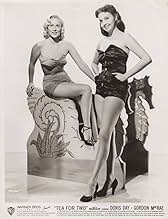IMDb RATING
6.5/10
2.2K
YOUR RATING
A socialite with aspirations of a career in show business bets her wealthy uncle $25,000 that she can say "no" to everything for two days straight, hoping winning will help her fulfill her d... Read allA socialite with aspirations of a career in show business bets her wealthy uncle $25,000 that she can say "no" to everything for two days straight, hoping winning will help her fulfill her dreams.A socialite with aspirations of a career in show business bets her wealthy uncle $25,000 that she can say "no" to everything for two days straight, hoping winning will help her fulfill her dreams.
- Awards
- 1 win total
Patrice Wymore
- Beatrice Darcy
- (as Pat Wymore)
George Baxter
- Mr. Woltz - Show Backer
- (uncredited)
Jack Boyle
- Chorus Boy
- (uncredited)
Tex Brodus
- Chorus Boy
- (uncredited)
Jack Colton
- Chorus Boy
- (uncredited)
Carol Coombs
- Friend of Lynne & Richard
- (uncredited)
Jack Daley
- Truck Driver
- (uncredited)
Herschel Daugherty
- Theatre Manager
- (uncredited)
Abe Dinovitch
- Taxi Driver
- (uncredited)
Elinor Donahue
- Lynne Smith
- (uncredited)
Storyline
Did you know
- TriviaThe first of five collaborations between Doris Day and Gordon MacRae. They would later go on to co-star in Fine and Dandy (1950), On Moonlight Bay (1951), Starlift (1951) and By the Light of the Silvery Moon (1953).
- GoofsAs is customary in movies of the 1950s the hairdos are all wrong: both the men and the women wear fashions of 1950 instead of 1929.
- Quotes
William 'Moe' Early: I made a fortune today. I sold short.
J. Maxwell Bloomhaus: Who did you sell short to?
William 'Moe' Early: You!
- Crazy creditsThe writing credit card originally read: Screen Play by Harry Clork, and the smudged out credit read: Suggested by the play "No, No, Nanette," by Frank Mandel, Otto Harbach, Vincent Youmans and Emil Nyitray.
Notably missing is the name of lyricist Irving Caesar, who was a co-lyricist of the original Broadway score of "No, No, Nanette." Yet receiving credit are Frank Mandel and Emil Nyitray, who actually wrote the play "My Lady Friends," on which the libretto of "Nanette" was based.
Apparently, there was a subsequent dispute involving these credits, the details of which remain obscure, but as part of the settlement of the matter, Warners agreed to blur the source credits on all future prints of the film (which now includes video, DVD, Blu-ray and cable TV versions).
- ConnectionsFeatured in Biography: Doris Day: It's Magic (1998)
- SoundtracksCharleston
Lyrics by Cecil Mack
Music by James P. Johnson (as Jimmy Johnson)
Danced by Billy De Wolfe and cast
Played at the Westchester estate
Featured review
Doris Day was involved in many musicals at Warners from 1948 onwards, and 'Tea for Two' is a typical example. Set in the stock market crash of 1929, this variation on 'putting on a show' has Day as both an heiress and a stage-struck singer and dancer, supported by her friends Jimmy the composer (Gordon MacRae, later to appear to good effect in 'Oklahoma' and 'Carousel'), and Tommy the hoofer (Gene Nelson, the cut-price Fred Astaire who ended up directing Elvis' minor musicals).
The score is nice but not that memorable - 'Tea for Two', 'No, No, Nanette', 'I Want To Be Happy', 'Do, Do, Do' - while the story, loosely based on the play No, No, Nanette concerns rivalries, lost investments, and a comic uncle (SZ Sakall, who played the same part in countless films throughout the 1940s and 1950s). Billy de Wolfe and Patrice Wymore round out the cast as a heel of a producer and his sniping leading lady.
As a film, 'Tea for Two' passes the time and boasts some great costumes and colour, even if most of the film doesn't have a 1929 feel. And the bookending sequences, with Sakall telling a tale to a roomful of children, doesn't quite sit with the rest of the material. But it isn't bad.
The score is nice but not that memorable - 'Tea for Two', 'No, No, Nanette', 'I Want To Be Happy', 'Do, Do, Do' - while the story, loosely based on the play No, No, Nanette concerns rivalries, lost investments, and a comic uncle (SZ Sakall, who played the same part in countless films throughout the 1940s and 1950s). Billy de Wolfe and Patrice Wymore round out the cast as a heel of a producer and his sniping leading lady.
As a film, 'Tea for Two' passes the time and boasts some great costumes and colour, even if most of the film doesn't have a 1929 feel. And the bookending sequences, with Sakall telling a tale to a roomful of children, doesn't quite sit with the rest of the material. But it isn't bad.
- How long is Tea for Two?Powered by Alexa
Details
- Runtime1 hour 38 minutes
- Aspect ratio
- 1.37 : 1
Contribute to this page
Suggest an edit or add missing content
































